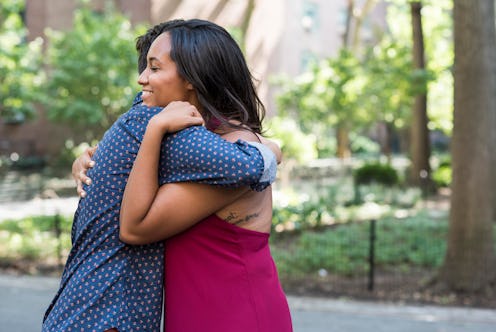Life
3 Subtle Ways To Improve Your Sense Of Empathy, According To Science

Few people would disagree that empathy is a good thing to have. But for some people, the ability to "feel" or share in the emotions of others, and understand them as if you were experiencing them yourself, doesn't come naturally. And while it's been suggested that this feeling is what makes us "truly human," it's OK if you want to improve your empathy. Empathy is not only useful as a human emotion in and of itself; it can also help us become better listeners, managers, partners, and even increase our happiness as a result. What's most interesting, though, is the emerging theory that empathy can in fact be learned. It's not static; you can actually make yourself more empathic.
How empathic are you to begin with? There are a variety of tests available to assess how much you identify with others, but one of the most popular is the Empathy Quotient or EQ, which was developed in 2004 and consists of 60 questions you have to rate, such as, "I can tell if someone is masking their true emotion." Being too highly empathic can also have its difficulties; for one, it makes it nearly impossible to watch movies based on cringe humor, but for another, it can mean that your own emotions become clouded by what other people are thinking and feeling. If you'd like to increase your empathy a bit, though, science has some ways to help out.
1Hang Out With Strangers More
In 2015, a group of Swiss scientists confirmed what might seem relatively obvious: humans learn more empathy when we spend time hanging out with new people. Having positive experiences with social groups that have different experiences than we do helps break down the idea that our experiences are different at all, and creates a better link with others.
2Experience Stress For Yourself
For a long time, it was assumed that all stress made people react in ways that got them away from the stressful situation, either by retreating into themselves, battling it head-on, or running away. Now, however, we know that a specific kind of stress doesn't follow this pattern; instead of prompting people to hide away from others to protect itself, it seems to cause an increase in empathy.
A study in 2017 found that when you're stressed out doing a task (and are told you're doing it wrong), your brain's "empathic circuit," which helps you imagine the pain and emotions of others and connect them to your own feelings, show more activity. In the study, 60 male undergrads were put through a stressful test while being given negative feedback, and then shown images of other people undergoing a painful procedure. The more stressed they'd been by the process, the more empathetic the subjects felt towards the people in the images, even though they were strangers. The study shows that just undergoing a kind of stress, even if it's a different experience than the person you're hoping to empathize with is undergoing, can help you build more empathy — so it's not as simple as going through the same thing as someone else.
3Make More Friends — And Go Through It Together
An experiment at McGill in 2015 found that our sense of empathy has a literal effect on our experience of pain. In the experiment, people were asked to put their arms into ice water in the presence of others doing the same, either strangers or friends, and rate their discomfort. Oddly, when friends were doing the same experiment, people rated their own pain as higher — not because empathy is painful, but because when we empathize more with someone, such as a friend, it seems to make us literally feel (or believe we feel) other peoples' pain.
However, it didn't take very much for an empathetic bond (measurable by the response to discomfort) to form. Just 15 minutes playing a video game with strangers changed them into people who could literally feel each others' pain — thanks to empathy.
4
Lesson: to increase a sense of empathy, it's important to be open to new experiences, both the good and the bad. Your friends, family, and partners — as well as the strangers who will one day become friends — will thank you.